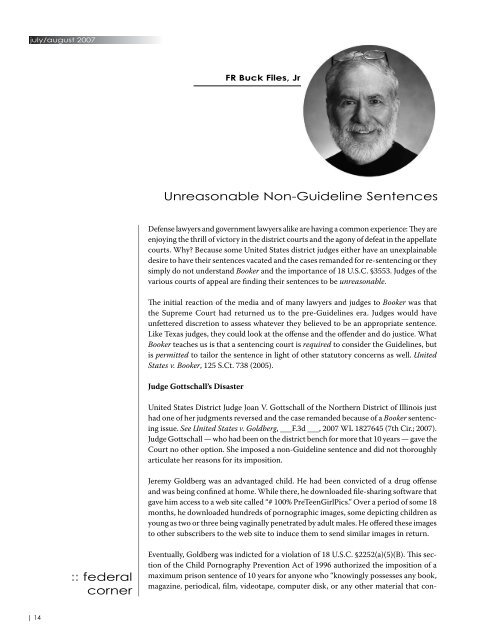M - Voice For The Defense Online
M - Voice For The Defense Online
M - Voice For The Defense Online
You also want an ePaper? Increase the reach of your titles
YUMPU automatically turns print PDFs into web optimized ePapers that Google loves.
july/august 2007<br />
FR Buck Files, Jr<br />
Unreasonable Non-Guideline Sentences<br />
<strong>Defense</strong> lawyers and government lawyers alike are having a common experience: <strong>The</strong>y are<br />
enjoying the thrill of victory in the district courts and the agony of defeat in the appellate<br />
courts. Why Because some United States district judges either have an unexplainable<br />
desire to have their sentences vacated and the cases remanded for re-sentencing or they<br />
simply do not understand Booker and the importance of 18 U.S.C. §3553. Judges of the<br />
various courts of appeal are finding their sentences to be unreasonable.<br />
<strong>The</strong> initial reaction of the media and of many lawyers and judges to Booker was that<br />
the Supreme Court had returned us to the pre-Guidelines era. Judges would have<br />
unfettered discretion to assess whatever they believed to be an appropriate sentence.<br />
Like Texas judges, they could look at the offense and the offender and do justice. What<br />
Booker teaches us is that a sentencing court is required to consider the Guidelines, but<br />
is permitted to tailor the sentence in light of other statutory concerns as well. United<br />
States v. Booker, 125 S.Ct. 738 (2005).<br />
Judge Gottschall’s Disaster<br />
United States District Judge Joan V. Gottschall of the Northern District of Illinois just<br />
had one of her judgments reversed and the case remanded because of a Booker sentencing<br />
issue. See United States v. Goldberg, ___F.3d ___, 2007 WL 1827645 (7th Cir.; 2007).<br />
Judge Gottschall — who had been on the district bench for more that 10 years — gave the<br />
Court no other option. She imposed a non-Guideline sentence and did not thoroughly<br />
articulate her reasons for its imposition.<br />
Jeremy Goldberg was an advantaged child. He had been convicted of a drug offense<br />
and was being confined at home. While there, he downloaded file-sharing software that<br />
gave him access to a web site called “# 100% PreTeenGirlPics.” Over a period of some 18<br />
months, he downloaded hundreds of pornographic images, some depicting children as<br />
young as two or three being vaginally penetrated by adult males. He offered these images<br />
to other subscribers to the web site to induce them to send similar images in return.<br />
:: federal<br />
corner<br />
Eventually, Goldberg was indicted for a violation of 18 U.S.C. §2252(a)(5)(B). This section<br />
of the Child Pornography Prevention Act of 1996 authorized the imposition of a<br />
maximum prison sentence of 10 years for anyone who “knowingly possesses any book,<br />
magazine, periodical, film, videotape, computer disk, or any other material that con-<br />
| 14

















